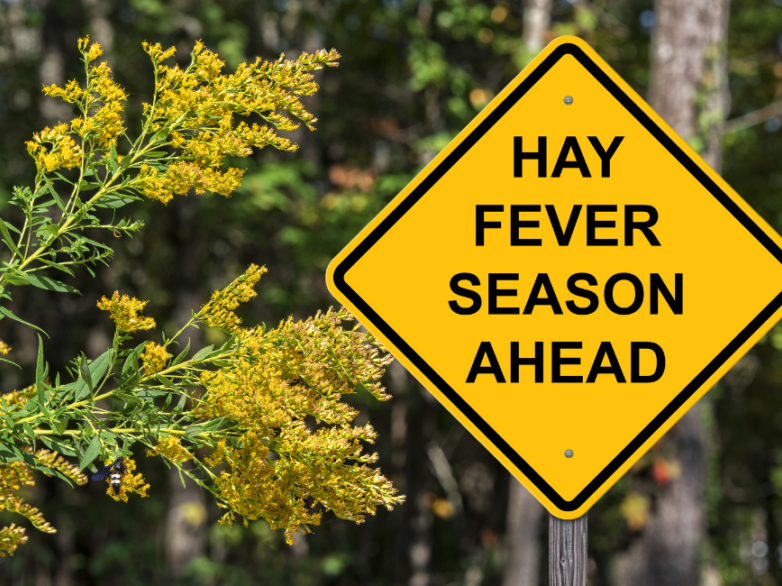
Why Do I Get Hay Fever
The answer to allergies, asthma or autoimmune issues is typically not a straightforward answer. However, there are things that you can do, naturally and safely, to ease your symptoms.
Around April/May millions of people start to suffer with hay fever. Not many people question why, the conversation is usually as short as this:
Person 1: My hay fever is so bad at the moment!
Person 2: Thankfully I don’t get hay fever!
Person 3: It’s that time of year. Mine is bad too.
Then person 1 and 3, along with millions of others, will pop an antihistamine and try and get on with their day. However, if more people took a moment to question why they got hay fever, and whether they could change their fate, then there would be a lot less itchy eyes and sore throats during allergy season!
WHAT IS HAY FEVER?

Hay fever, also called allergic rhinitis, causes symptoms such as congestion, sinus pressure, sneezing, runny nose and itchy eyes, similar to the common cold virus. However, hay fever is an allergic response to external allergens, not a virus.
Allergens could be pet fur or flakes of pet skin, feathers, dust mites, cockroaches, fungi and moulds. Those who experience seasonal symptoms are most like reacting to tree pollen, grass pollen or ragweed pollen.
Even though hay fever is considered a common issue that many people just have to “live with”, it can hugely interfere with your day-to-day life, making you miserable whilst doing so.
If you experience hay fever, your immune system is identifying a harmless airborne substance as something harmful and, as a result, it is producing antibodies to try an attack the substance to defend your body.
Every single time you come into contact with this substance, the antibodies that your immune system has created will release histamine, and other chemicals, into your bloodstream, which results in the symptoms of hay fever.
WHAT MAKES HAY FEVER MORE LIKELY?

- Being prone to allergies
- Asthma
- Genetic predisposition
- Toxicity build-up in the body
- Poor gut health – so many allergies start in the gut!!
- Living or working in a high-allergen environment
- Smokers or being exposed to smoke from an early age
WHAT IS HISTAMINE?
Histamine is a chemical that is produced inside our bodies, which is released by antibodies when triggered by the immune system in reaction to coming into contact with an allergen.
The histamines leave mast cells and boost blood flow towards the area of your body that the allergen has come into contact with, resulting in inflammation. What happens when you experience inflammation? Your immune system then gets fired up again for other chemicals in the body to repair the damage.
Build-up of histamine in the body can result in skin irritation, digestive issues, shortness of breath, headaches and more.
What people don’t realise is there are many foods that contain histamine and can cause histamine build up, as well as aggravate those who suffer from hay fever and other allergies. Alcohol, smoked meat, aged cheese, legumes that come in a can such as canned chickpeas, beans and peanutscitrus fruits and fermented foods all have a reasonably high amount of histamines. I myself have a history of mastocytosis so I try to cook pulses in my Instant Pot whenever possible to try and avoid the canned ones…
So, you could be eating lots of fermented foods and legumes, thinking you helping your gut and overall health, but if you’re histamine sensitive you could be doing more harm than good!
CAN I OVERCOME MY HAY FEVER?

Medical professionals suggest to just avoid allergens and use antihistamines or nasal sprays to ease symptoms. This masking the symptoms, not helping from within. Plus, antihistamines will disrupt your natural chemical balance, making it harder to naturally improve your reaction to allergens.
It’s ‘unknown’ why some people produce antibodies against pollen and others don’t, but it is now more common to produce them than not and this increase has been mostly observed in developed countries. Isn’t this a good enough indicator? Why are we not joining the dots? It’s clear that a westernised diet, high in processed foods, and increased exposure to toxins and pollutants from the environment, cleaning products and cosmetics will be having a detrimental effect on our health, including resilience against allergens.
So, if we detoxify our body, heal our gut and make nutritional and lifestyle changes, we can reduce the histamine reaction to allergens. How do I know this can work? I’ve seen it happen in my clinical practice!
I have a specific supplement-based allergy protocol that I use with my clients, but we always start with the 21 Day Reset, which is a functional medicine detox.
You can take specific supplements, foods, adopt a low-histamine diet and implement certain practices to help with symptoms in the short term, but for long-term relief I suggest looking inward at your gut health. If you heal your gut, you will have a fighting chance against reducing your reaction to allergens, because a lot of allergies begin in the gut!
If you came to my private practice with allergies, the first thing that I would be looking at would be your gut function and your cortisol levels. A food sensitivity test would be very valuable as it is often part of the equation to. There is a specific company that I recommend for food sensitivity tests (check out my website for more info) because a lot of tests being marketed out there don’t give you the full picture. If you were then able to afford an extra lab test, I would suggest the Omega-3 test, to check your ratio of omega-3 to omega-6, because higher omega 6s can also contribute to allergies as well!
Remember, there is always a reason why!

Follow Our Instagram For Exclusive Content





 د.إ / AED
د.إ / AED



Leave a comment